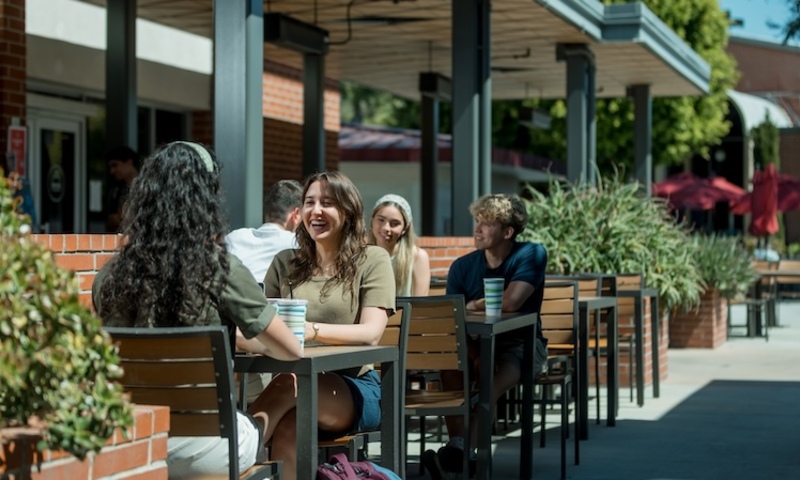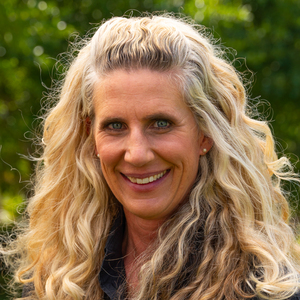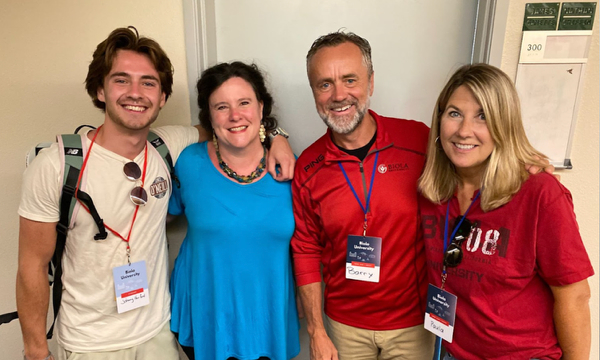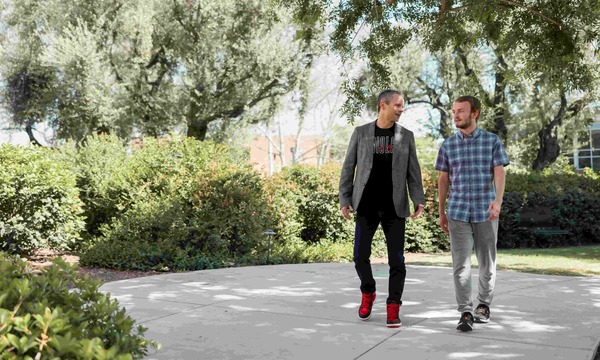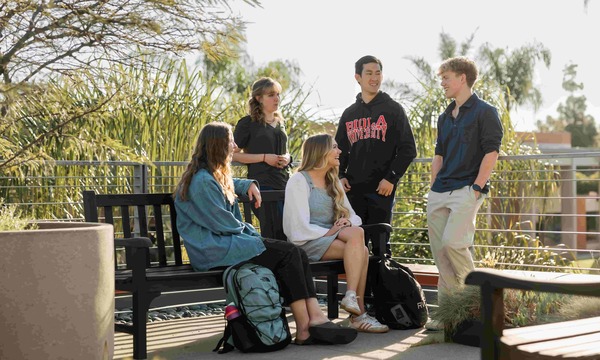Move-In Day is THIS MONTH!!
If your eyes just popped out of their sockets like a rubber chicken, you’re not alone. We can’t believe it either! But we’re thrilled your student will be joining us on campus so soon.
We recently hosted a webinar called “Conversations to Have Over Summer” with our Associate Vice President of Student Success and Academic Engagement, Tiffany Lee and Dean of Community, Sandy Hough. At the webinar, these two campus leaders answered questions about the transition to college life for both students and parents (watch the webinar on YouTube).
You can help your student feel confident and prepared as they make the transition to Biola by taking the time to have a few important conversations with them. These conversations can be short and still have a huge impact!
Here are some conversations we recommend you have with your student before they begin at Biola:
“Are your enrollment tasks complete? Are there any I can help you with?”
Before they begin at Biola, your student must have completed their enrollment tasks through their MyAccount. They’ll be finished when their Fall 2024 status moves from “Not Enrolled” to “Enrolled.”
Your student may need your help for things like Health Tasks and Payment. You can find a full guide to completing these tasks on our blog post, “My Account Tasks: Helping Your Student Complete Enrollment.”
“What do we need to shop for?”
Your student likely needs a few things before coming to campus!
If they’re planning to live in a residence hall, be sure to check out our blog post, “Dorm Room Shopping: Your Questions, Answered,” and download the Official Biola University Packing List.
“What are our expectations for communication while you’re away?”
It’s vital to make sure you’re on the same page as your student when it comes to communication. Having this conversation now can prevent worrying, tensions and hurt feelings in the future.
There’s no right or wrong answer when it comes to frequency of communication — it can all depend on whether they’re dorming or commuting, how far away you live, and what your communication styles have been in the past — but setting clear expectations about how often you’ll check in with each other is important. Will it be twice a week? Once a day? A few texts throughout the week and a longer phone call on Sunday afternoons? Talk it over with your student!
Ask your student questions like:
Who will initiate our communication? Me? You? Both of us?
What’s your preferred communication method?
How often would be too often for me to check in with you?
You can always revisit expectations with your student in the future, but having this conversation before they begin at Biola is essential!
“How often will you be home during the semester? What will holidays look like?”
Once again, clear communication and expectations is essential for both your happiness and your student’s! Take some time to look over the 2024–25 Academic Calendar with your student and make plans about how often they’ll make trips home.
If your student is commuting, you might see them daily, but their rhythms will likely have changed dramatically. Talk with your student about how often they’ll join your family for meals, weekends and holidays.
“Let’s look into the on-campus resources available to you!”
There is an abundance of resources available to Biolans, and you can help make sure your student knows how to take advantage of them! Be sure your student knows about:
Center for Marriage and Relationships
“How are you feeling about connecting with professors in office hours?”
A student who has formed a relationship with their professors will get more out of their classes and will have pre-established trust if they’re ever struggling with schoolwork and need to reach out for help.
The prospect of reaching out to professors may feel scary for your student (especially if they spent a portion of their high school years at home or on Zoom due to Covid!), but meeting with a professor for office hours is an incredibly helpful way to get advice on assignments, workshop papers, and receive mentorship from faculty who care for both their studies, their life and their walk with the Lord.
Encourage your student to take advantage of the world class faculty they have easy access to while they’re here — it’s what you’re paying for!
“Let’s look at your fall schedule and brainstorm what your study times might be!”
For many students who come to college right from traditional high school, the schedule transition is big. All of the sudden your student has gone from a regular, 8 a.m. to 3 p.m., five day a week schedule to block classes, long breaks in their day, evening classes, and, sometimes, entire weekdays with no school at all. On top of that, no teacher is hovering over their shoulder to ensure they complete their essays and presentations, so they have to take more ownership of their education.
It may help your student immensely to sit down with you and brainstorm when they will study throughout the week so that they begin the semester with a plan for managing their time. The schedule they decide on now can always change, but beginning the semester with a plan puts them on a path to success.
“I really encourage you to take risks in relationships!”
Biola is a community of students from across the globe. Our undergraduate population alone has students from 45 states and 50 countries! Your student’s time at Biola is an incredibly unique period of their life where they’ll be learning alongside others who are different from them — that’s an amazing opportunity!
Encourage your student to reach out to a classmate or grab coffee with a neighbor from their dorm who they may not initially gravitate towards. They may be surprised where the relationship goes.
“It’s important to care for yourself. Let’s talk through how you might do that!”
Success in college (and all of life!) largely depends on simple things like diet, exercise and sleep. You can help your student think ahead about how they’ll take care of themself. Help them walk through questions like:
What time do you hope to go to sleep each night? How many hours of sleep do you need to function well?
What will your eating habits be like? What kind of snacks will you gravitate towards? How often is too often for pizza in the Caf?
How often will you do laundry?
What’s your expectation for balancing schoolwork with exercise and leisure?
When will you spend time with the Lord alone? How can that time play into your rhythm of attending chapel?
“What do you hope to be involved in on campus?”
Getting involved on campus is the best way to make friends at Biola. When your student chooses a club, ministry or activity to be involved in, they’ll be instantly immersed in a community of people who share their interests.
Take a moment to look through our menu of ways to get involved with your student and help them choose one or two they may want to try right away.
“It’s important to learn how to say ‘no’”
Saying “no” to things is an important skill, especially when there are countless exciting things your student could be involved in on campus. Help your student set realistic expectations for what they can be involved in, and help them think through when and how they might need to say “no” to opportunities so that they can give themself fully to the other things they are committed to.
“It’s important to get into the habit of checking your Biola email!”
Your student’s Biola email address will be their main line of communication for all things Biola: professors, classmates, administration, financial aid, etc. Encourage them to get into the habit of checking it daily.
“Which chapel do you think you’ll try first?”
Biola offers at least four chapels per week, and each chapel has its own distinct format. Encourage your student to look through our Fall Chapel Schedule and note which ones look interesting to them. Remember, they need to attend at least 20 per semester!
“Will you have a car with you on campus? If not this year, in the future?”
All students are allowed to have a car on campus (we have plenty of parking!). Students who bring a car must simply register their vehicle with Campus Safety.
If your student is bringing a car, be sure they are prepared with their driver’s license and insurance information and that they know how to take care of maintenance or car emergencies if need be.
If your student is not bringing a car, make sure they know that they have a grocery store, restaurants, coffee shop, drug store, churches and more within walking distance of campus. You can also help them think through when they might need to get a ride from a friend.
“Will you work while you’re on campus?”
There are plenty of on-campus jobs available to students at Biola. If your student plans to get a job while they're here, you can begin reviewing the student employment process together and peruse Handshake for available jobs.
If your student plans to work on campus, they’ll need to have a social security card and US passport or driver’s license, or visa documentation.
If your student has any questions about on-campus jobs, they can reach out to student.employment@biola.edu.
“Where will you go to church? How will you be involved there?”
Though we’re a Christian campus, Biola is not a replacement for the local church. And we wouldn’t want it to be!
There are plenty of fantastic local churches in the area. You can help your student look through our church life resource to pick a few local churches to try. Talk with them about the importance of the local church and how they might get involved in one once they’re here.
“Can we come visit for family weekend in October?”
Make a plan to come join us on campus in October! Family Weekend features concerts, family activities, our annual university talent show and more, and it’s a great chance to come see your student once they’ve settled into their new life here at Biola. Mark your calendar for October 25 – 26.
You don't have to have all of these conversations at once! Consider splitting up these topics over a longer drive and a dinner together, or choose one evening a week to sit down and discuss with your student until the semester starts. If any questions arise as you're discussing with your student, their admissions counselor is happy to help. Don't hesitate to reach out!
 Biola University
Biola University